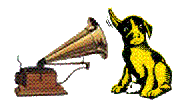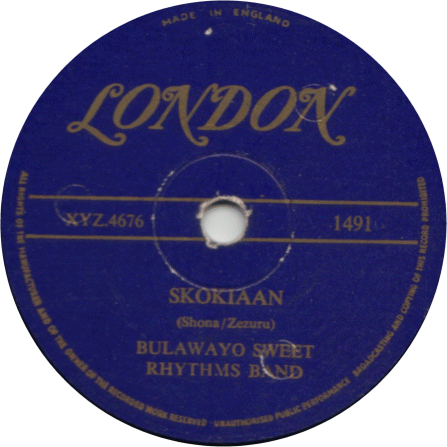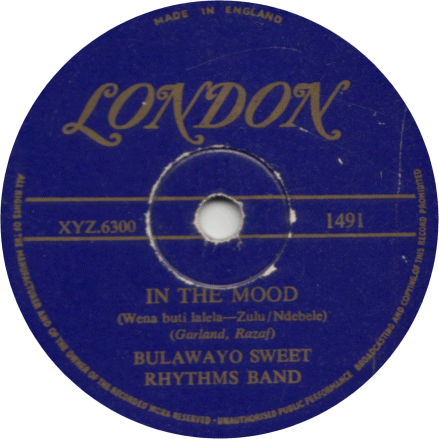
The Beatles
at 78 RPM
|
Cool 78 of the Month September 2008 |
|
Bulawayo Sweet Rhythms Band Skokiaan London 1941 (USA) 1954 |

|
|
Bob Brown loved music. As a professor of music at Wesleyan University he expanded its musicology programme to encompass the sounds of non-Western cultures. Brown called this genre World Music. Students were made aware of the myriad of sounds of cultures from exotic places like Indonesia, India, and Africa. Until this time the most exotic sound these kids had heard was their parent's Martin Denny LPs. Twenty years later the music industry woke up and acknowledged that some of this stuff wasn't half bad and gave birth to World Music as marketing niche and set it off in search of high priced coffee shops and people who pay twice the price to look cool. To them World Music or World Beat was so radical and new that it just screamed for exploitation in all areas except for hits on the singles charts. Too bad that some of us had grown up listening to world beat of another sort. We placed a stack of old worn 78s on the Dana label from Chicago on the turntable and sang along in pidgin-slavic languages to polkas, waltzes and czardas. And possibly buried deep in our parent's record collection was a 78 that took Word Music into the Billboard charts in 1954. That 78 was Skokiaan by the Bulawayo Sweet Rhythms Band under the direction of Rhodesian August Musarurwa. Just as it took several years for Bob Brown's coined term to enter our popular vocabularies, August Musarurwa's recording of Skokiaan took a few years to go global. August Musarurwa was a 22-year-old policeman and self-taught saxophone player with the policeman's band. After a job change, August joined the Bulawayo Cold Storage Commission. As luck would have it, they too had a band. Like all the townships in South Africa, Bulawayo was a hotbed of hot music, and in 1947 the band of the Bulawayo Cold Storage Commission found themselves recording one of August's original compositions, Skokiaan, a slightly easier to spell and pronounce version of the Shona word for the local firewater known as Chikokiyana. South Africa's Gallotone records released it as a part of their Jive series, catalog # GB.1152, calling the band The African Dance Band of the Cold Storage Commission of Southern Rhodesia, Leader: August Musarurwa. Not only did August lead the band, but also wailed away on the lead sax. In 1951, August's sound came to the attention of ethnomusicologist Hugh Tracey. Tracey and his wife travelled over southern and central Africa, recording groups like the Cold Storage Band. These came to the further attention of Gallotone who released a new recording of Skokiaan in 1954, this time as by the Bulawayo Sweet Rhythms Band. The group may have changed a bit but the August's sax work still dominated the track. It is said to have sold 170,000 in South Africa alone when it came to the attention of E. R. Lewis, president of Gallotone's international partner London Records. A few years earlier another record with southern African roots, Wimoweh by the Weavers on Decca 27928, had stormed up the U.S. charts, and Lewis saw a chance to repeat its success. He sent copies to London's offices in New York urging them to give it a good listen. As this was going on, deejay Bill Randle at WERE in Cleveland Ohio acquired a copy of the 1947 recording. The record was cracked, but Randle liked Skokiaan's swinging, happy melody. He contacted London records in New York and secured a copy of the 1954 version. Randle played it four times and the phones began to ring. People wanted this record! London began shipping copies and before they knew it, 26,000 had sold. This propelled it to number 17 on the Billboard singles chart. The rest of the record biz took notice and soon the racks in the stores saw competing versions by likes of big band leader Ralph Marterie on Mercury 70432 (a #3 hit), Ray Anthony, Perez Prado, Louis Armstrong, and even Canadian pop group The Four Lads, who recorded the first English language vocal version and released it on Columbia 40306 (a #7 hit). Even Bill Haley recorded it, albeit as his last hit, in 1959. Louis Armstrong's version is of particular note as he extended it over two sides of the 78, recording both vocal and instrumental version. So popular was the tune, that in addition to cover versions in every decade since its release, that even streets where named after its, such as Skokiaan Drive in Franklin Ohio. The fun, doesn't stop at the A-Side though. This is one record worth flipping for the B-Side has an equally exciting history. Fully uniting the American big band sound with African rhythms, August had the Bulawayo Sweet Rhythms Band record the Glenn Miller classic In The Mood. When the Beatles recorded All You Need is Love, George Martin's arrangement featured the riff from In The Mood's intro as a part of its coda. Martin didn't think that his appropriation would be an issue, but the estate of Joe Garland (no relation to Judy), the songs composer saw it differently. From that was borne a complex trail that should show that In The Mood borrowed heavily from a 1929/ 1930 recording entitled Tar Paper Stomp by jazz trumpeter and bandleader Wingy Manone. Further complicating matter is a 1930s recording called Hot and Anxious on Columbia 2449-D by the Baltimore Bellhops, an incognito name for Fletcher Henderson's band that featured Louis Armstrong (Who may or may not be on this recording), the man who covered Skokiaan in the 50s and meet August Musarurwa in 1960, going on to invite him to come to the states. Some oldies are just so darn good that it's a darn shame that they are totally ignored by oldies station and stations that play pop from the 50s. Skokiaan is one, who while the song has lived on, the record is a truly lost oldie. Don't hold your breath waiting for Sam, Jack or Bob to play it. |
|
B Side Bulawayo Sweet Rhythms Band In The Mood |

|
